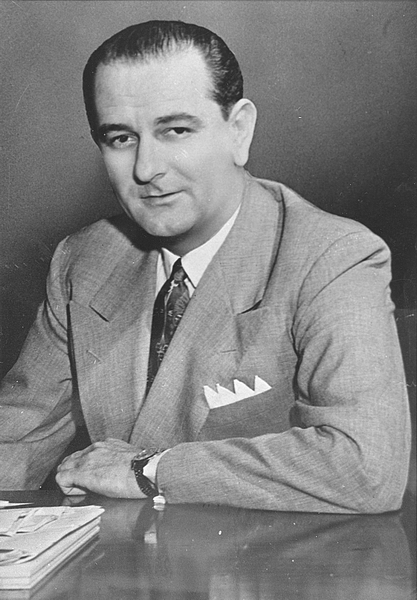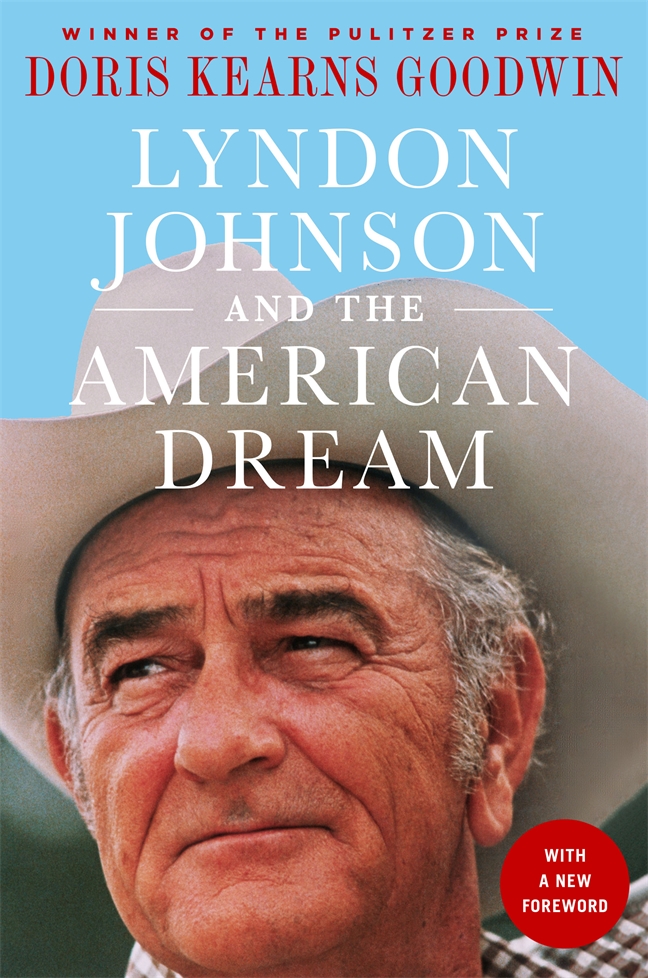by Doris Kearns Goodwin
Updated for 2019 with a new foreword from the author, Doris Kearns Goodwin’s Lyndon Johnson and the American Dream is an extraordinary and insightful biography of the former president. This book traces the 36th president’s life from childhood up to his early days in politics, and from his leadership of the Senate to his presidency, analyzing his dramatic years in the White House—including both his historic domestic triumphs and his failures in Vietnam. Keep reading for an excerpt.
Upon his arrival in Washington, it was both natural and expectable that Johnson would want to learn how things worked in the nation’s capital⸺the relationships and sources of power⸺just as he had at Johnson City, San Marcos, and Cotulla. The task, of course, was more formidable. Many a small-town giant had been swallowed up by a city whose concerns were as varied as the affairs and populace of the nation. Nevertheless, to Johnson, the activating principles were much the same. If he had more to learn than ever before, that meant only that there was no time to waste. The day after his arrival he moved into the Dodge Hotel, where he would be assured of natural and informal contact with the seventy-five other congressional secretaries resident in the same building.

Photo portrait of Lyndon B. Johnson as U.S. Senator for Texas and Majority Leader. Image is in the public domain via Wikipedia.
Before Johnson had even finished unpacking his suitcase, he was walking up and down the hall, knocking on doors, shaking hands, and telling each person his life history and future plans. One bathroom at the end of the corridor served all the tenants on the long floor. That first night, as Johnson later described it, he went in and out four times and took four separate showers so that he could talk with as many people as possible. The next morning, beginning at 7 A.M., he went into the bathroom five different times at ten-minute intervals to wash his face and brush his teeth. Within a week, Johnson had chosen five young men who he had decided were the most clever, the most experienced, and the most informed to be his “teachers.” He possessed, Johnson liked to claim years afterward, a sensitive mechanism which allowed him immediately to evaluate the intelligence of a person and the worth and validity of his information.
With the help of his new acquaintances, Johnson wanted to take apart the clock of the congressional world in order to discover what made it tick and how each of the many tiny pieces fit together. He had already learned to concentrate on events behind the scenes, but he needed guidance in working his way through the informal channels of power. At the same time, he wanted to understand the pros and cons of the major policy struggles that would be confronting the Congress in the months ahead. So desperately did Johnson crave this knowledge that his every conversation, whether over meals or during strolls around the Monument, became a planned interview in which he probed, questioned, and directed the discussion to his ends. At lunch, he deliberately pushed himself to the head of the cafeteria line so that he could finish eating before the others sat down, and be free to concentrate on the questions he wanted to ask. If the answer seemed unclear or incomplete, he would demand clarification. If he was still not satisfied, he would turn to someone else and ask for a counteropinion. “The astonishing thing was,” a fellow resident later said, “that Lyndon made us feel as if we were the pupils and he were the teacher and we wanted to be sure to perform as well as we could.” Living in the Dodge, another resident, Arthur Perry, observed, “was like living in a perma nent debating society, with Lyndon as the focal point.”

If people were the main source of Johnson’s education, he also read the three daily newspapers in the Washington of 1931, as well as the New York Times, the Wall Street Journal, and the local Texas papers. Every evening he assembled a packet of night reading, including the daily Congressional Record, copies of pending bills, pamphlets, booklets, newsletters of various organizations, official publications, and com mittee reports; he relaxed in bed with a sheaf of government documents as others relax with a good mystery. Congressional secretary Arthur Perry, who observed the education of Lyndon Johnson in the ways of government, concluded, “This skinny boy was as green as anybody could be, but within a few months he knew how to operate in Washing ton better than some who had been here twenty years.”
As Johnson was learning his way on Capitol Hill, the administration, led by Herbert Hoover, was fighting for its survival and that of the national economy. Johnson arrived in Washington in the winter of 1931, as the nation entered its third year of depression. Twenty-eight thousand businesses had failed that year, farm income had dropped three billion dollars, and eight million people⸺one worker in every seven⸺were unemployed. Belief that the decline was a temporary mis fortune was being displaced by the apprehension that the sources of collapse might be fundamental and resistant to known remedies. Still, Washington was not entirely a gloomy, stagnant city that winter. Having controlled the administration of national government for more than seven decades⸺interrupted only by the administrations of Grover Cleveland and Woodrow Wilson⸺the Republican Party was now on the defensive. In ways yet undefined, the old order was changing. And amid such enormous distress there was an inevitable intensity, a sense of excitement mingled with hope, in the mounting prospect of new leaders and new policies. Washington shared this anticipation with the country, but Washington also had more personal and specific concerns. It was a town with only onebusiness⸺national politics and government⸺and the old management was on the run. One could already foresee new opportunities for the talented and ambitious, dangers for the long established. And there would be plenty of talk in what Henry James had called the City of Conversation.
It was, to the extent that James’ characterization was fair, a city marvelously adapted to the talents of Lyndon Johnson. Conversation for him was always a medium through which he sought to impose his will, as well as a source of information that helped him direct his energies toward desired goals. By analyzing the composition of San Marcos College and inquiring into the wishes of diverse student groups, he had been able to consolidate and activate the powerful coalition of nonathletes that had helped topple the Black Stars. In the late 1950s, as Senate Majority Leader, he would utilize a decade of investigation into the political imperatives and personal qualities of individual Sena tors to devise civil rights legislation that members could support for different, often contradictory, reasons. His intuitive grasp of the ways in which men and institutions might be moved to action was always grounded in an extensive accumulation of detailed knowledge, deliberately and laboriously acquired. Information was power, or, at least, a primary instrument of power. It strengthened, made more effective, his drive for control over successively larger environments until the arena became so vast it could not be comprehended in the same fashion by even the most tireless and encompassing mind. And such information would serve his compelling inward need to neutralize the possibility of surprise; a possibility which he perceived as a danger, and a danger which would be increased by uncertainty or ignorance about the motives, capacities, and intentions of others. In the process of self-education, as in so many of Johnson’s modes of operation, the imperatives of psychic structure coalesced with the pragmatic requirements for achievement in the political world.
DORIS KEARNS GOODWIN is a celebrated historian and the author of Team of Rivals, The Fitzgeralds and the Kennedys, Lyndon Johnson and the American Dream, and other bestsellers. She lives in Concord, Massachusetts, with her husband and their three sons.
